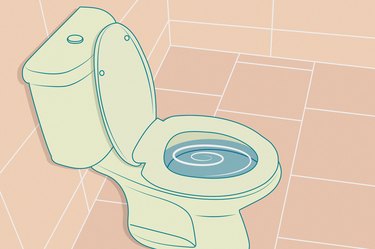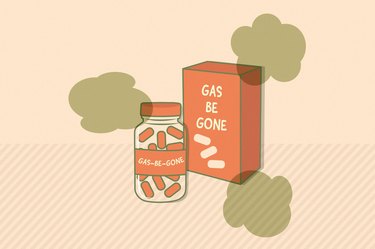
While we may not talk about it, passing gas is something we all do multiple times a day. In fact, on average, humans fart anywhere between 13 to 21 times daily, according to Houston Methodist.
That's a lot of breaking wind. And we're willing to bet these frequent farting episodes often occur at inopportune times (say, when you're in a work meeting or during a workout).
Video of the Day
Video of the Day
Even if you could quietly release your gas, there's still the threat of stinking up a room with the silent-but-deadly type. All this is to say, sometimes holding in a fart feels like a better choice than letting one casually slip.
But are there consequences when you choose not to toot? Rest assured you won't explode. But there can be some uncomfortable side effects.
Here, Elena Ivanina, DO, MPH, director of neurogastroenterology and motility at Lenox Hill Hospital and founder of gutlove.com, explains what happens when you hold in a fart.
First Things First, Why Do We Fart?
Farts form in our body because we have gas in our digestive tract, Dr. Ivanina says.
Once gas accumulates, we need to release it in one of two ways: by burping or farting.
Burping expels gas from the upper GI tract (i.e., the stomach and the esophagus), while farting involves letting gas pass in the lower part of your gut, according to Houston Methodist.
While there are many reasons for gas in our guts, there are two common culprits, Dr. Ivanina says:
- First, we swallow a lot of air (such is the case if we eat too quickly or chew gum). And this air contains gases like nitrogen, according to Nemours Children's Health.
- Second, our microbiome produces gas when it ferments fiber. Indeed, when your large intestine breaks down food, it creates gases like hydrogen, carbon dioxide and methane, per Nemours Children's Health.
No matter the cause, eventually gas — which isn't released through belching — will make its way through your GI tract to its final destination (aka your butthole). "Farting is just releasing this gas through the anus when it arrives in your rectum," Dr. Ivanina says.
So, Is It Bad to Hold in a Fart?
It's the million dollar question we're all wondering: Where the heck does the gas go when you refuse to let one rip?
"When you hold in a fart, you are tightening your anal sphincter muscles, i.e., the same muscles that help you control when it's time to poop," Dr. Ivanina says.
And because the gas has nowhere to go, it stays trapped in your GI tract, at least temporarily. "If you do not release the gas, it remains in the gut," Dr. Ivanina says.
But your gut is one long tube, which means that one part affects another, she adds. So gas that wasn't released out your rectum may cause unwanted symptoms in other sections of your GI tract.
The Risks of Holding in Farts
Here's what could happen when you withhold your wind:
1. It Can Cause Bloating
If you've ever prevented yourself from passing wind, you may have noticed that your belly blew up like a balloon.
"Bloating happens as your gut expands with gas and takes up more space in the abdominal cavity," Dr. Ivanina says. Eventually, this causes the abdomen to protrude out, she says.
2. It Can Produce Pain or Discomfort
"Your gut is a tube and can only contain so much," Dr. Ivanina says. "The more it expands with gas, the more distended and uncomfortable one feels."
With all this pressure building in your body, it's no surprise why foregoing a fart can produce abdominal pain.
3. It Can Travel to Your Lungs
Believe it or not, your trapped fart can find its way to your lungs.
"It is true that some gas is absorbed through the gut wall into the bloodstream and can ultimately get to the lungs and be exhaled," Dr. Ivanina says.
So, wait: If you don't fart, does it come out your mouth? Not exactly, Dr. Ivanina says. The gas released through your mouth doesn't have a farty smell, so don't fret about having fart breath.
4. It Can Worsen a Bowel Obstruction
Preventing yourself from passing gas can cause problems in people with rare, dangerous conditions such as bowel obstruction, Dr. Ivanina says
An obstruction occurs when there's a blockage in the GI tract that gets in the way of food or poop passing through the intestines, she says. Adhesions, hernias, cancers and certain medicines are usually the origin of an intestinal obstruction, according to the National Library of Medicine.
If you have a full obstruction, nothing can move forward. But when it's a partial blockage, gas can still travel through the tube. And it would be critical to allow this gas to pass, Dr. Ivanina says. That's because by holding in a fart, you can increase intra-abdominal pressure and worsen distension, which even can result in tearing, she says.
Theoretically, Holding in a Fart May Raise Your Risk of Developing Diverticulosis
A habit of holding in farts too frequently may be harmful in the long run, as it could potentially lead to the development of diverticulosis.
“Diverticulosis is the presence of pouches in the digestive tract that develop due to increased pressure in the colon and a weakened gut wall,” Dr. Ivanina says. “Theoretically, if there is a constant high volume of gas in the gut putting pressure on the wall, one could imagine it would increase the risk of developing these outpouchings.”
That said, Dr. Ivanina stresses that this is just a hypothesis, which is not currently backed by research. “This has not been studied, and excess gas in the gut has not been considered a risk factor for diverticulosis or diverticulitis [a condition that happens when the pouches become inflamed or infected],” she says.
How to Reduce Flatulence
While you can't completely control how often you cut the cheese (it's a natural bodily function, people), you can do a few things to get rid of excessive gas and fart less frequently:
- Eliminate your gas triggers. Dr. Ivanina recommends keeping a journal to track which foods make you fart the most. For many people, dairy, gluten and high-FODMAP foods produce the most gas, she says. Don't want to give up your fave gassy foods? Speak to a dietitian who can help you strategize how to "lower gas formation from the microbial fermentation of food," Dr. Ivanina says.
- Eat slowly and mindfully. When you take your time to chew, you prevent excessive swallowing of air, Dr. Ivanina says. And less air in your gut means fewer farts coming out your butt.
- Cut down on carbonated drinks. Kick your La Croix habit to the curb, Dr. Ivanina says. Carbonated beverages contain bubbles, which are full of gas.
- Exercise regularly. "If you don't move, your gut doesn't move," Dr. Ivanina says. "And the slower your gut, the more excess gas can accumulate." Physical activity keeps things flowing smoothly and in the right direction.
- Talk to a gastroenterologist. Certain GI conditions — such as small intestinal bacterial overgrowth (SIBO) — may be contributing to the formation of excess gas in your gut, Dr. Ivanina says. See a GI specialist who can properly assess, diagnose and treat you.
So, How Bad Is It Really to Hold in a Fart?
When you bar yourself from breaking wind, the risks aren't super serious in most cases. You'll mostly experience temporary bloating and discomfort that'll dissipate once you cut one loose.
Still, holding in a fart isn't fun. While you can stifle your butt sounds in the short term, sooner or later the gas must come out.
It's always healthier to relieve yourself than to fight the flatus. "The quicker you release, the better," Dr. Ivanina says. "Just excuse yourself, find a bathroom, turn on the fan for noise coverage and let it go."
Is this an emergency? If you are experiencing serious medical symptoms, please see the National Library of Medicine’s list of signs you need emergency medical attention or call 911.






